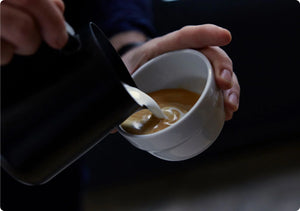
REGIONALS DECAF
A decaf that can stand toe-to-toe on flavour with its caffeinated counterparts. Expect a toffee sweetness with a chocolatey finish.
Free UK delivery over £28
Free Royal Mail 48 Tracked delivery when you spend £28.
Social impact
65% of our profits are reinvested into our barista training programme.
Sustainability
Our packing is completely plastic free and we plant a tree for every bag sold through the Eden Reforestation Project.
- Producers
- Small Holders
- Variety
- Mixed
- Process
- MC Natural Decaf
- Altitude
- 900-1100 MASL
REGIONALS DECAF
Most Brazilian coffee is grown on huge farms, built and equipped for mechanical harvesting and processing, maximizing productivity. The relatively flat landscape across many of Brazil’s coffee regions combined with high minimum wages has led most farms to opt for this type of mechanical harvesting over selective hand-picking.
In the past, this mechanization meant that strip-picking was the norm; however, today’s mechanical harvesters are increasingly sensitive, meaning that farms can harvest only fully ripe cherries at each pass, which is good news for specialty-oriented producers.
In many cases and on less level sections of farms, a mixed form of ‘manual mechanized’ harvesting may be used, where ripe coffee is picked using a derricadeira – a sort of mechanized rake that uses vibration to harvest ripe cherry. A tarp is spanned between coffee trees to capture the cherry as it falls.
With the aid of these newer, more selective technologies, there’s a growing number of farms who are increasingly concerned with – and able to deliver - cup quality.
After harvest, cherry is typically laid to dry in thin layers on patios. Under direct sunlight, cherry is carefully monitored and turned frequently.
The Process:
The methylene chloride (MC) decaffeination process is relatively simple. The coffee beans are moistened with water and MC is circulated throughout. The MC binds with the caffeine in the bean and extracts it while leaving most of the other flavor compounds. After the desired caffeine level is reached, the MC residue on the beans is removed by steaming them.
Because MC is not naturally occurring in plants, the resulting decaffeinated coffee cannot be labeled as “naturally decaffeinated.” However, MC has been determined by several health organizations not to be a health risk in amounts under 10 parts per million (PPM). In MC decaffeinated coffee, MC remains in amounts under 1 PPM. Further, MC is highly volatile and evaporates at 40 degrees C. Considering the high temperatures of roasting (about 204 degrees C) and brewing (about 93 degrees C) it is highly unlikely that any MC remains in the final beverage.
SOCIAL IMPACT
As a social enterprise, Old Spike’s primary mission is to help reduce homelessness in the UK through training and employment within speciality coffee.
With 65% of the profits we generate going back to supporting our social mission, we rely entirely on traded income to meet our social objectives.
